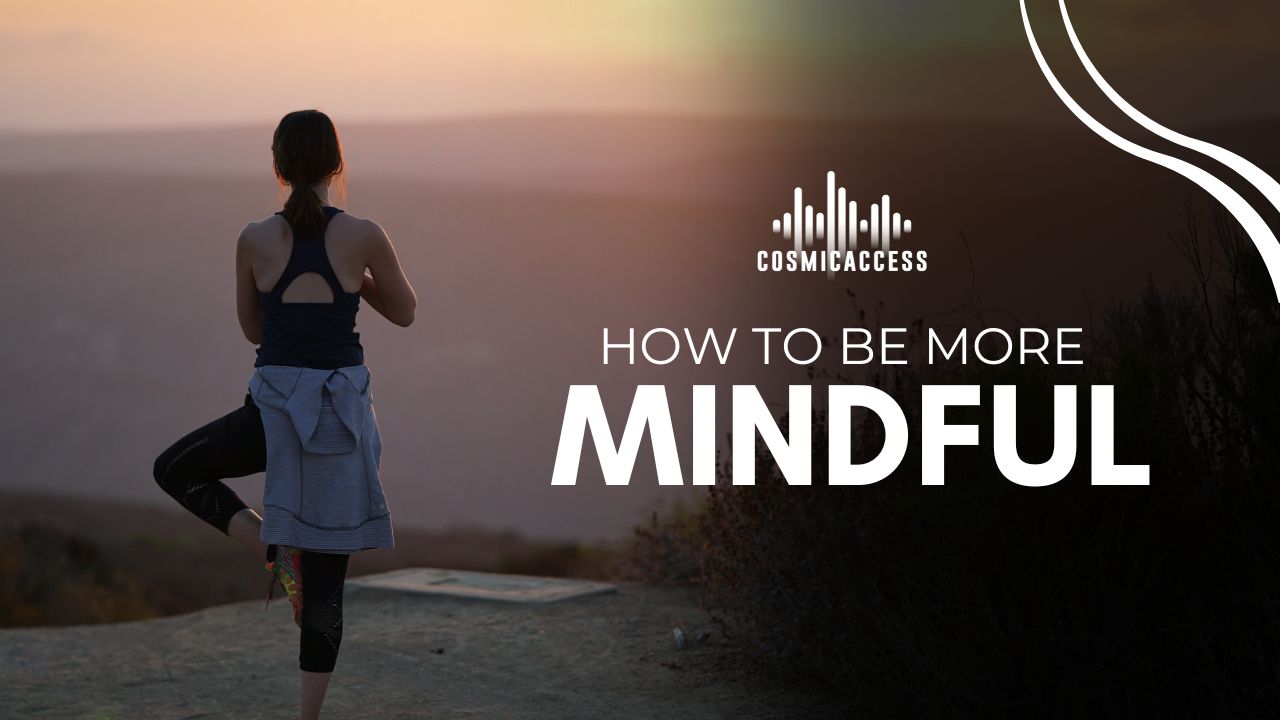In today’s fast-paced world, finding moments of peace can feel impossible. But what if you could bring more clarity, calm, and intention into your daily life? "How to be more mindful" explores simple yet powerful ways to cultivate mindfulness—whether through meditation, breathwork, or small shifts in your daily routine. Discover how to quiet the noise, stay present, and truly enjoy each moment. Ready to embrace a more mindful life? Let’s dive in.
How To Be More Mindful?
- Understand What Mindfulness Really Means
- Focus on Your Breathing
- Incorporate Mindfulness into Everyday Activities
- Practice Mindful Eating
- Try Meditation
- Reduce Digital Distractions
- Be Mindful in Your Relationships
- Spend Time in Nature
- Practice Gratitude
1. Understand What Mindfulness Really Means
Mindfulness is not just about meditation; it’s a way of living. It means consciously paying attention to what you are doing instead of operating on autopilot. Whether you are eating, walking, or having a conversation, mindfulness encourages you to be fully engaged in the present rather than dwelling on the past or worrying about the future.
2. Focus on Your Breathing
One of the easiest ways to anchor yourself in the present moment is through conscious breathing. Try taking slow, deep breaths while focusing on the sensation of air entering and leaving your body. A simple exercise is the 4-7-8 method: inhale for four seconds, hold for seven seconds, and exhale for eight seconds. This can help calm your nervous system, reduce stress, and bring awareness back to the present.
3. Incorporate Mindfulness into Everyday Activities
You don’t need extra time to be mindful—it can be practiced during routine activities. Whether you’re brushing your teeth, sipping coffee, or folding laundry, try to be fully engaged in the experience. Notice the sensations, movements, and even sounds associated with each action. This simple shift can help you develop a deeper appreciation for ordinary moments.
4. Practice Mindful Eating
Eating mindfully can enhance your relationship with food and improve digestion. Instead of rushing through meals or eating while distracted, slow down and savor every bite. Pay attention to the flavors, textures, and aromas of your food. Chewing slowly and appreciating each bite helps you stay present and prevents overeating.
5. Try Meditation
While mindfulness can be practiced in daily life, meditation is one of the best ways to strengthen it. Even just five to ten minutes of meditation a day can help improve focus, emotional balance, and self-awareness. Sit in a quiet place, close your eyes, and focus on your breath. If your mind wanders, gently bring your attention back without judgment.
6. Reduce Digital Distractions
Technology is a major source of distraction, making it harder to stay present. Try limiting your screen time by setting specific hours to check emails and social media. Turn off unnecessary notifications and schedule screen-free moments, such as during meals or before bedtime. This allows you to be more present with yourself and those around you.
7. Be Mindful in Your Relationships
Mindfulness also applies to how you interact with others. When having a conversation, truly listen rather than thinking about what to say next. Make eye contact, pay attention to the speaker’s words, and respond thoughtfully. This helps deepen connections and creates more meaningful interactions.
8. Spend Time in Nature
Nature naturally encourages mindfulness by engaging your senses. Take a walk outside, feel the sun on your skin, listen to the sounds of birds, and notice the colors around you. Being in nature helps ground you in the present moment and reduces stress.
9. Practice Gratitude
Gratitude is a key part of mindfulness. Take a few moments each day to reflect on what you’re grateful for. It could be something as simple as a good cup of coffee, a kind word from a friend, or a peaceful moment in your day. Writing down a few things you appreciate can shift your mindset to be more positive and present.
Mindfulness is a simple yet powerful practice that can transform the way you experience life. By focusing on your breath, reducing distractions, and making small intentional changes, you can cultivate a more peaceful and fulfilling way of living. The key is to start small and be consistent. Over time, mindfulness can help you feel more present, balanced, and in tune with yourself and the world around you.
Also Read: Bija Mantra: Discovering the Sacred Energy of Bija Mantras
What Does It Mean To Be Mindful?

Being mindful means being fully present and aware of your thoughts, emotions, and surroundings without distraction or judgment. It involves paying close attention to the present moment rather than dwelling on the past or worrying about the future. Mindfulness encourages a deep sense of awareness, allowing you to observe your thoughts and feelings without reacting impulsively.
Practicing mindfulness can be as simple as focusing on your breath, savoring a meal, or truly listening during a conversation. It helps reduce stress, improve focus, and enhance emotional well-being. Mindfulness is not about emptying the mind but about acknowledging each moment with clarity and acceptance.
By incorporating mindfulness into daily life, you can cultivate greater patience, gratitude, and inner peace. Whether through meditation, mindful breathing, or slowing down in everyday activities, mindfulness allows you to experience life more fully and intentionally.
How Do You Train Yourself To Be Mindful?

To train yourself to be mindful, start by practicing daily mindfulness exercises, like focusing on your breath for a few minutes each day. Pay attention to your senses in everyday activities—notice the sights, sounds, and sensations around you.
Reduce distractions by limiting phone usage and setting aside time for quiet moments. When your mind wanders, gently bring your focus back to the present without judgment. Over time, these small practices will help you become more aware, focused, and present in each moment, naturally integrating mindfulness into your daily life.
What are the 7 C's of mindfulness?
Mindfulness is about more than just being present; it’s about cultivating qualities that help you respond to life with clarity, compassion, and a deeper understanding of yourself. The 7 C’s of mindfulness offer a simple yet powerful framework to guide you on your journey. From clarity in your thoughts to courage in facing challenges, each "C" contributes to developing a mindful approach to daily living. By embracing these principles, you can create a more peaceful, grounded, and focused life, regardless of what comes your way.
The 7 C’s of Mindfulness are key principles that help cultivate a more present, aware, and balanced life. They guide mindfulness practice and encourage a deeper connection with oneself and the world.
1. Clarity – Developing clear awareness of thoughts, emotions, and actions.
2. Calm – Cultivating inner peace and reducing stress.
3. Compassion – Practicing kindness and empathy toward yourself and others.
4. Curiosity – Observing experiences with an open and non-judgmental mindset.
5. Courage – Facing challenges and emotions with acceptance and strength.
6. Connection – Strengthening relationships with yourself, others, and the present moment.
7. Concentration – Focusing your attention fully on the present experience.
How To Become More Mindful In Your Everyday Life

To become more mindful in everyday life, start by focusing on the present moment. Pay attention to your thoughts, feelings, and physical sensations without judgment. Practice mindful breathing to calm your mind and stay grounded. Incorporate mindfulness into daily tasks, like eating or walking, by fully engaging in the experience. Limit distractions by reducing screen time and setting aside quiet moments. Lastly, be kind to yourself—acknowledge when your mind wanders, and gently bring your focus back to the present without frustration. Over time, these habits will help you live with more awareness and intention.
How To Be More Mindful In Spirituality
To be more mindful in spirituality, practice being fully present during spiritual rituals, prayers, or meditation. Focus on the experience rather than distractions, letting go of any judgments or expectations. Cultivate a deep awareness of your inner thoughts and emotions, allowing you to connect more authentically with your spiritual beliefs. Regularly set aside quiet time for reflection or contemplation, fostering a sense of peace and gratitude. Stay open to the present moment and deepen your connection with your spiritual path by embracing mindfulness as part of your spiritual practice.
Spiritual Mindfulness Exercises
Spiritual mindfulness exercises can help deepen your connection to the present moment and your spiritual practice. Start with breathing meditation, focusing on each breath as a way to center yourself. Gratitude journaling can also enhance spiritual mindfulness by reflecting on what you’re thankful for. Another practice is mindful prayer, where you focus fully on the words and intentions, avoiding distractions. Walking meditation in nature allows you to connect with the earth while staying present. Lastly, practice body scans, bringing awareness to each part of your body, fostering deep relaxation and spiritual awareness.
Difference Between Mindfulness & Spirituality
Mindfulness is the practice of being fully present and aware in the moment, often used to reduce stress and increase focus. It involves observing thoughts and feelings without judgment. Spirituality, on the other hand, is a broader concept that relates to a sense of connection to something greater, often tied to religion or personal beliefs. While mindfulness can be part of spiritual practices, it is not inherently religious. Mindfulness focuses on the present moment, while spirituality explores deeper existential questions and connections to the divine or universe.
Also Read: Singing Bowl Tones And Frequencies: All You Need To Know
Conclusion
Being more mindful is about cultivating awareness and presence in every moment. By practicing techniques like mindful breathing, focusing on daily activities, and reducing distractions, you can bring more clarity, calm, and intention into your life.
Remember, mindfulness is a journey, and with consistent practice, it becomes easier to stay grounded and connected. Whether you're new to the practice or looking to deepen your experience, learning how to be more mindful can transform your mental, emotional, and spiritual well-being for the better.





Leave a comment
This site is protected by hCaptcha and the hCaptcha Privacy Policy and Terms of Service apply.